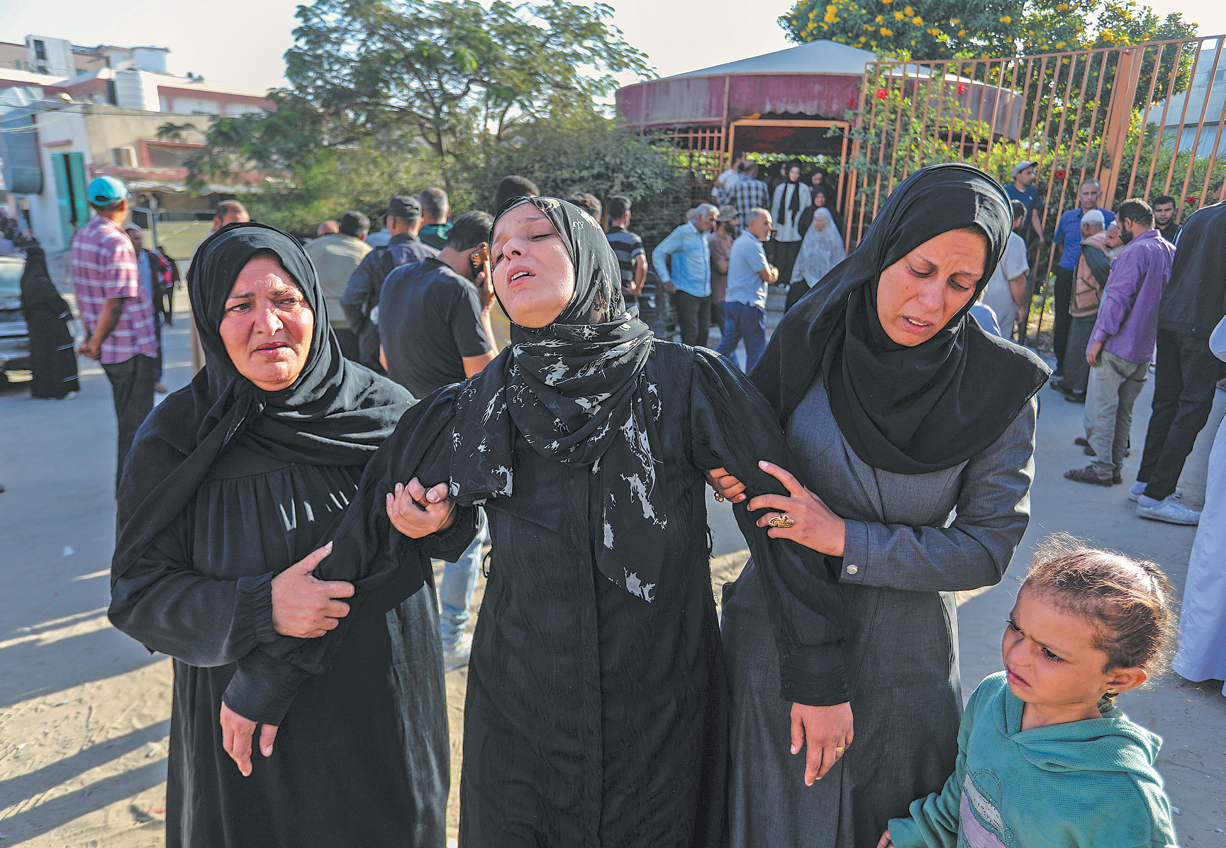
The international community's concerns over the implementation of the Gaza truce have quickly intensified, as the fragile deal confronts mounting challenges amid a spate of apparent violations — most notably Israel's continuing airstrikes across the enclave, which have shattered a week of relative calm.
Qatar, a key mediator for the United States-backed ceasefire, accused Israel on Tuesday of violations, calling the country's military offensive on the Palestinian territory "nothing but genocide".
"We reiterate our condemnation of all Israeli violations and practices in Palestine, especially turning the Gaza Strip into an uninhabitable area, continuing to breach the ceasefire, expanding settlements in the West Bank," Qatari Emir Sheikh Tamim bin Hamad Al Thani said in an annual address to the country's legislative council.
It came after US President Donald Trump on Monday threatened to "eradicate" Hamas if it breached the 11-day-old truce. US Vice-President JD Vance landed in Israel on Tuesday, and Trump's Middle East envoy Steve Witkoff and son-in-law Jared Kushner were already in Tel Aviv.
"We made a deal with Hamas that they're going to be very good, they're going to behave, they're going to be nice," Trump said. "If they're not, we're going to go and we're going to eradicate them, if we have to. They'll be eradicated, and they know that."
Senior Hamas official Khalil al-Hayya has said that the group has been assured by Trump and mediators that the conflict in Gaza is over.
The ceasefire established an outline for hostage and prisoner exchanges between Hamas and Israel, and proposed a road map for Gaza's future.
However, the latest events reflected the stumbling blocks to keeping the long-sought truce from unraveling and securing a lasting peace after two years of conflict. Key questions of Hamas disarmament, further Israeli troop withdrawals and the future governance of the enclave remain unresolved.
ALSO READ: Sources: Israel rejects Hamas participation in Gaza technocratic govt
Both sides have said they are committed to the deal, and Israel confirmed on Monday that Hamas handed over the body of another hostage, taking the total to 13 of the 28 it had pledged to return.
However, Israel carried out dozens of strikes in Gaza on Sunday using what Prime Minister Benjamin Netanyahu described as 153 metric tons of explosives. Gaza's civil defense agency said the strikes killed at least 45 people across the territory and a total of 100 people had been killed since the ceasefire took effect on Oct 10.
Israel said the series of strikes was provoked by Hamas militants firing gunshots and an anti-tank missile at its troops in southern Gaza, an attack that the group denied carrying out. The Israeli military said two soldiers were killed. One Hamas official accused Israel of fabricating "pretexts" to resume the offensive.
Stephane Dujarric, spokesman for United Nations Secretary-General Antonio Guterres, said the UN was "concerned by all acts of violence in Gaza".
"We urge all parties to honor all of their commitments to ensure the protection of civilians and avoid any actions that could lead to a renewal of hostilities and undermine humanitarian operations," he said.
Peacekeeping force
Egypt's Foreign Minister Badr Abdelatty said in an interview with The National newspaper that Egypt is pushing for a UN Security Council resolution "as soon as possible" to establish a peacekeeping force in Gaza, as media reported earlier that Cairo is expected to lead a stabilization force made up of at least 4,000 troops from Egypt, Azerbaijan, Turkiye and Indonesia.
However, he said "it will not be acceptable to have foreigners" running Gaza, insisting that the mission of the force and the US-proposed "Board of Peace" should be tasked to provide support for Palestinians to run their own affairs.
Meanwhile, the European Union's foreign policy chief, Kaja Kallas, said on Monday that the bloc is leaving the door open to sanctioning Israel to maintain leverage to ensure the Gaza ceasefire is fully implemented.
"The ceasefire has changed the context — that is very clear for everybody," Kallas said after a meeting of EU foreign ministers in Brussels. "However, unless we see real and sustained change on the ground, including more aid reaching Gaza, the threat of sanctions remains on the table."
Before the truce deal was brokered, the EU had proposed measures against Israel, including blacklisting ministers and curbing trade ties.
As the reopening of the Rafah border crossing between Gaza and Egypt remains on hold, leaders from nine EU countries around the Mediterranean Sea said on Monday that they fully expected Israel to open border crossings into Gaza for the "immediate release" of humanitarian aid.
A total of 986 aid trucks have entered the coastal enclave since the ceasefire began, out of the 6,600 trucks that were supposed to arrive by Monday evening, Gaza's government media office said.
Agencies contributed to this story.


